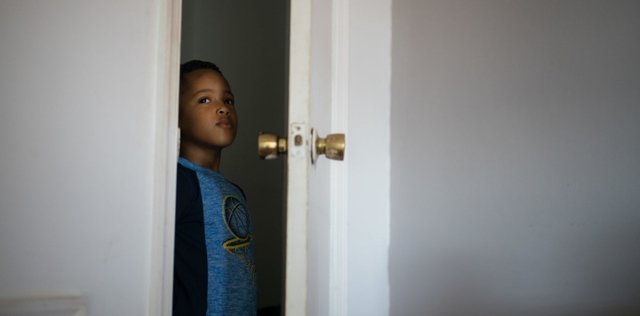United States: a migrant child returned to his mother, but is no longer the same
Before they were separated in the southwestern border of the United States, the 5-year-old son of Ana Carolina Fernandes loved to play with the Minions, the yellow and naughty characters from the films of My Favorite Villain. Now his favorite game is to frisk and handcuff "migrants" with plastic shackles.

Thiago, 5 years old, inside a closet in his home in Philadelphia. He reunited with his mother after two months of separation in the southwestern border of the United States. Todd Heisler / The New York Times
Thiago was forcibly removed from his mother for fifty days. He is no longer the same child that the Border Patrol agents took Fernandes from his arms when they arrived in the United States from Brazil, his mother lamented.
The first time they arrived home after reunification, the boy (who had not taken breast milk in years) asked him to breastfeed. When home visits arrived in Philadelphia, he ran to hide behind the sofa.
"It has been like this since I recovered it," said Fernandes. "He does not want to talk to anyone."
Thiago is one of nearly three thousand children who were forcibly separated from a father at the border as part of the new zero tolerance immigration policy of the Donald Trump government. After the resulting furor, the US president ended the family separation on June 20 and since then more than 1,800 children have been reunited with their parents.
"Our volunteers have seen the significant and real weight that these traumatic separations have had on the children and the lives of their families, which remain even after reunification," said Joanna Franchini, who coordinates a network of volunteers working with children. migrants and their parents called Together & Free.
A 3-year-old boy who was separated from his mother has been acting as if he were handcuffing and vaccinating people around him, a behavior he surely saw when he was in the custody of the Immigration and Customs Enforcement Service. Some brothers now cry every time they see someone in the street uniformed.
So far, most of the problems that children show include a pronounced anxiety during any routine that separates them even for a few seconds from their parents, either because they go to the bathroom or are in another room, according to those who monitor the reports.
"These children do not want to be without their mothers; they detonate a feeling of abandonment or that they are going to take their mother away, "said Luana Biagini, a legal assistant who has worked with the reunited Brazilian families.
"I have worried mothers who complain that their child was more outgoing and talkative, and that he is now taciturn and hardly responds," said Biagini, who works at a law firm in Boston.
Part of the reason for the trauma is that the same parents were also traumatized, because their children were snatched from their arms between cries and screams. Other children seem to have been tricked into telling them that they were going to play with other children, without the parents or the children knowing; later they could not communicate with each other for up to weeks. Experts believe that children may have thought of it as a punishment.
Decades of research have shown that children traumatically separated from their parents have a high probability of developing emotional problems, cognitive delays and long-term trauma. More recent studies have found that separation affects memory and the production of cortisol, the hormone that arises in reaction to stress.
"There is no greater threat to the emotional well-being of a child than being separated from its primary caregiver. Even if it's for a short period, it feels like an eternity for a child, "said Johanna Bick, a professor of psychology at the University of Houston who studies adverse experiences in childhood.
The long-term effects for separated children will depend on factors such as how long they were away, how abrupt the separation was and how difficult the journey was through Mexico. The trauma can be mitigated with early professional intervention and parenting focused on care.
The bad news is that the first years of life are very sensitive moments for brain development and what happens can have a dramatic impact later, "said Bick, whose research has focused on children in temporary shelters and foster families. . "The good news is that children are resilient and early intervention can benefit them."
The Trump government put some of the children separated into one hundred shelters, sometimes located hundreds of kilometers from where their parents were. While there their basic needs were met, the environment was more restrictive than supportive. For security reasons, for example, children are prohibited from touching each other; even if they are brothers and want to hug each other. The staff of most of the shelters was told that